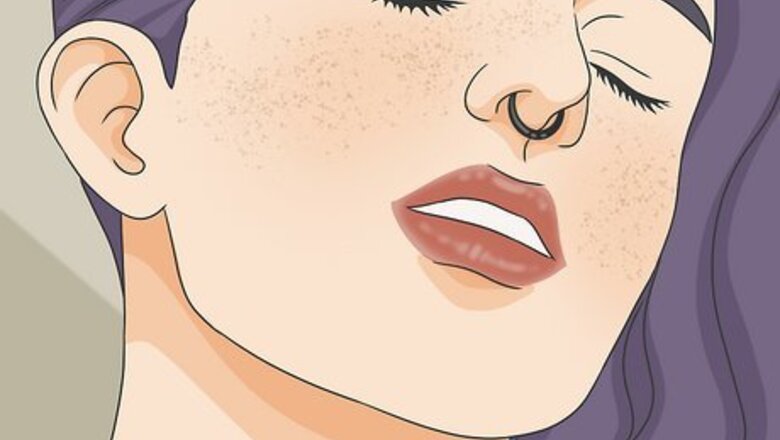
views
- There is no universal meaning for nose rings, sexual or otherwise. They're a form of self-expression that means something different for each individual.
- Nose rings have been linked to sexual liberation because of their popularity during the 60s hippie movement.
- Septum piercings, or bull nose rings, are sometimes viewed as more sexually provocative because of their association with BDSM, but this isn't super common.
Modern Sexual Meanings of Nose Rings

Nose rings can represent sex-positivity. Nose rings are often worn by those who are independent, rebellious, and empowered. Because of this, some people interpret the piercings as a sign of sexual openness and positivity. Because getting a nose piercing can increase someone’s confidence in their appearance, it can also make them more confident in their sexual expression. While nose rings are not inherently sexual, someone could choose to wear one to make them more comfortable with their sexuality. Septum piercings, or bull nose rings, are sometimes viewed as more sexually provocative because of their association with BDSM, but this isn't super common.

Some LGBTQ+ people use nose rings to signal their sexuality. It’s important to note that having a nose ring is not directly linked to your sexuality, but some people choose to embrace the stereotype to show other LGBTQ+ people that they’re also a member of the community. For example, according to many good-natured jokes on social media, bisexuals often have septum piercings. Some bisexuals therefore choose to wear their nose ring to let others in the LGBTQ+ community know their sexuality, but having a septum piercing does not mean someone is bisexual. In the past, it was often believed if a man got the left side of his nose pierced, he was gay, and if he got the right side pierced, he was straight. There's no authoritative source behind this belief, and anyone of any sexuality can get whatever piercing they choose. Remember, never make assumptions about someone’s identity based on their appearance. The way someone dresses is a way of expressing themselves and does not have an inherent meaning.
Cultural Sexual Meanings of Nose Rings

Nose rings have different meanings in India. In some parts of India, nose rings are worn by married women as a symbol of modesty and respectability. In other parts, they’re often worn by sex workers and are viewed as a symbol of promiscuity.

In Hinduism and Buddhism, nose rings represent fertility. In these religions, the nose is believed to be connected to women’s reproductive health. Therefore, nose rings often symbolize women’s ability to have children. According to the Sushruta Samhita, a Hindu medical text, nose rings placed in the right nostril promote fertility, easy childbirth, and mild period pain. Alternatively, Ayurveda practitioners believe the same for a nose ring placed in the left nostril.
Historical Sexual Meanings of Nose Rings

In the 1700s, European sailors saw nose rings as a sign of sexual promiscuity. These sailors often sailed to foreign countries and engaged in sexual relations with foreign women. The women likely wore nose rings for cultural reasons that the sailors either ignored or misinterpreted.

Nose rings represented free love in the 1960s. Nose rings saw an increase in popularity with the hippie movement of the 60s, so they were sometimes associated with hippie values. They came to represent free love, non-monogamy, and sexual liberation.

Freud believed nose piercings were related to unwanted sexual urges. Psychoanalyst Sigmund Freud believed in the nasogenital theory, which views the nose as a direct link to the reproductive organs. If someone pierced their nose, he saw it as a sign of a sexual disorder or a taboo sexual preference.














Comments
0 comment